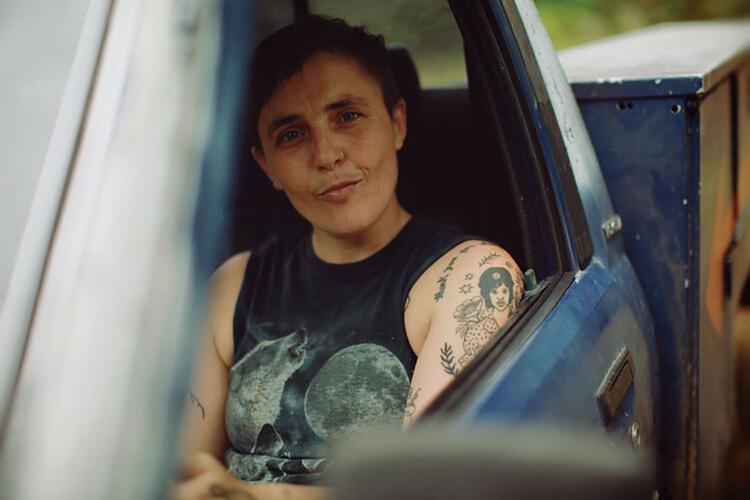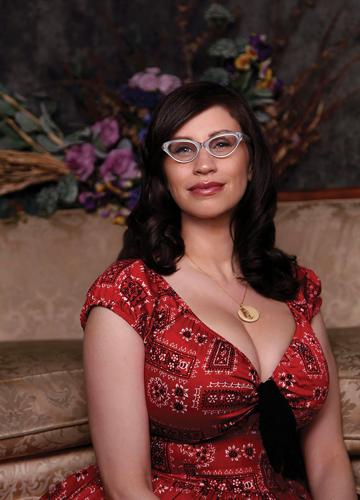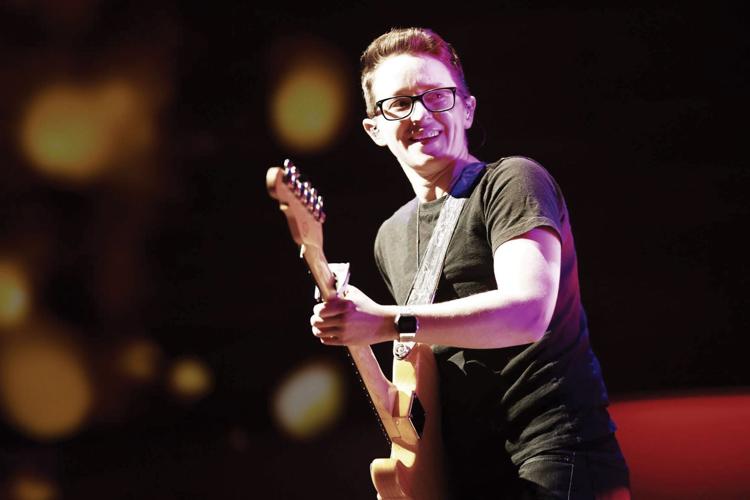As the world has cautiously moved back toward “normal” over the past year (new COVID variants notwithstanding), it’s been easier to see how “normal” was not beneficial for everyone — not in our world, and certainly not in the country and Americana industries. We reached out to some of the most creative voices for change within those spaces: Ellen Angelico (she/her/they/them), Karen Pittelman (she/her), and Kym Register (they/them). On a recent video call, the three offered their ideas about organizing philosophies, what it would take to change the music industry — and if it’s worth keeping around at all.
When Angelico is not on tour as a backing musician with artists like Cam, you can find her at Fanny’s House of Music, serving on Nashville’s Metro Arts Board of Commissioners, and on Zoom meetings for the Nashville Musicians Union, AFM Local 257. Pittelman leads the Brooklyn-based country group Karen & the Sorrows and founded the Gay Ole Opry in 2011, laying the groundwork for the success of today’s queer country scene. She is also the author and co-author of several books about philanthropy and activism. Register, based in Durham, N.C., performs under the name Loamlands. Along with Kamara Thomas, they are one of the organizers of the Country Soul Songbook conference, and they’re a co-founder of The Pinhook, which may be the first openly queer-run ticketed music venue in the South.

Ellen Angelico
Can you describe your organizing philosophy?
Ellen Angelico: Organizing is vital to layers of people in the music business. There’s the artists that are the top tier, that get nominated for the awards. And then you’ve got all different levels of artists underneath that. People who you never hear about that still have some of the trappings of big success: They have a label, they have an agent. Then you’ve got people under that who are trying to do it independently. And all of those types of artists employ people underneath them. Each one of those artists represents an ecosystem. So the task of organizing is, like, really big — it’s bonkers! The type of organizing that’s necessary for that top tier of artists is very different from the type of organizing that’s necessary for stagehands.
That’s a nut I don’t know how to crack. The only way that I have been able to keep my head on straight about it is to focus on the sphere that I’m in, which is people who are working in what can mostly be described as mainstream country and Americana music as backup musicians.
The extent of my organizing is that I’ve made a very nice spreadsheet that I’ve sent to some people.
Kym Register: At first, my vibe was — and still is — “Fuck the system!” But I’m realizing through friendships with people like you, Ellen, and in working with Kamara [Thomas] of Country Soul Songbook, and wanting to listen to my Black friends, my Indigenous friends that are just, like, “Actually, [access to the system] is what I want.” How do I reconcile “fuck this system” with working alongside people who are like, “And also I need to get paid, and this is how I need to get paid.”
Within the capitalist system, there will never be equity. That’s my philosophy, but it isn’t everybody’s philosophy. So Country Soul Songbook works outside of the industry, but is inviting industry folks in — creating a space that is artist-run for artists. But I hear you, Ellen. Where do I fit? Where, at this point, do my politics fit and with whom do they fit? Asking those questions makes you a good organizer, I think.
Karen, I know Gay Ole Opry is also outside of the mainstream system.
Karen Pittelman: Both Ellen and Kym reflected my general commandments of organizing. Number one is: Organize where you come from. Number two is spreadsheets and everything that entails. Organizing can’t happen without the often invisible logistics, often feminized labor, of just keeping track of everybody, reaching out to people, making lists, figuring out transportation, figuring out child care, food and so on. The third commandment is: You’ve got to figure out what people want, what people need. It doesn’t matter what you think things are supposed to be — that’s never gonna work.
EA: If you accidentally misattribute any of these guys’ quotes to me, I will be so thrilled!
KP: Organizing in the music industry is so different than other kinds of political organizing because it’s an industry — but also it’s art, and it’s also musicians who are not usually politicized.
KR: The music industry as a capitalist system is based on this falsehood of precarity.
It’s like, we had the first single, what happens after the first record gets a little bit of play, but not enough, or like Rolling Stone Country wrote one thing about it. Oh, you really need an article. And then once you’re out there, you’re always chasing something, right? Whether you’re politicized or not, I think, it’s such an individualized industry. I think that makes it really hard to organize each other. Some musicians are some of the most politicized people that I know — but they need to make another paycheck.
Could you talk a little bit about your current projects, what sparked your passion for this work?
EA: In my short career, I’m super, super proud of everything I’ve done. Everything that I thought I was going to be as a kid, I am. That’s an amazing feeling. And so I think that given all that success and all that privilege, the only thing that I can do in response is try to serve. To that end, I serve on Nashville’s Metro Arts Commission, which is basically a body that promotes arts in Nashville and oversees government funding for the arts. It was something that Nashville came up with in the ’70s. I’ve been really interested in equity work there. But that’s reliant on my own connections, so it’s time to start expanding that circle beyond who I actually know.

Karen Pittelman
KP: I started putting on the Gay Ole Opry and the Queer Country Quarterly and organizing queer people in country music 10 years ago. I also started thinking a lot about, “How does that work stay intersectional? How do we talk about the relationship between country music and white supremacy?” In 2016, I wrote this long essay that was originally just going to be a one-pager to try to bring people together for a group we just sort of offhand started, called Country Music Against White Supremacy. The first project that came out of that was the Change Country Pledge, which is still ongoing. That’s a thing that came out of listening to everybody else. It’s clear that nobody is wanting to see anybody make any more statements. Everybody was very sick of that.
People want to see other people throw down and share their resources, share their access. But this means trying to organize people who have more access, and I find that the more famous people are, the less interested they are in talking to you if you are not equally famous. I find that a very kind of complicated position to be in that I have not reconciled yet and makes me feel gross.
KR: I’m working on a lot of things. I feel lucky to be a part of Country Soul Songbook, this amazing group of people who are trying to connect, build community. Kamara Thomas is driving the fucking bus, she’s got her [commercial driver’s license]! I think she would say Country Soul Songbook is trying to create a community outside of the industry for artists to gain power back over their own image and their own art, to be able to organize and fall back in love with what they do and have a place that they can go to for sanctuary.
I love playing country music. I’m queer as hell. I know a lot of queer people and Black people and Latinx people and Indigenous people that play country. It’s just been a journey of coming back to having all these identities included through The Pinhook, the queer-owned DIY space I run.

Kym Register
What’s been inspiring to you this past year?
KR: I’m going to say something that might be controversial: I love virtual. And I think this has leveled the playing field in a way. I’ve been able to create relationships with people, and because I couldn’t tour, I had to sit and think, “Well, what was fucked-up about what I was doing?”
I’m excited by and interested in the accountability practice with the Americana Music Association. Before, any statements they made were gestural. Now there’s organizing around that. I’m cautiously hopeful about where we’re headed — and incredibly doubtful we’ll ever get there. But I know we need to keep trying.
KP: Over the last year or so, many people have stepped forward with their visions and making it happen, from Kym and Kamara and Country Soul Songbook to Holly and Black Opry. And seeing so many other people in the music world just come out to support and say, “I have been waiting for this!”
EA: I would just say kids — the kids in my life that are making art are totally unencumbered by a lot of what encumbered me, growing up, in terms of identity and equity.

The state of country music now and in the year ahead









